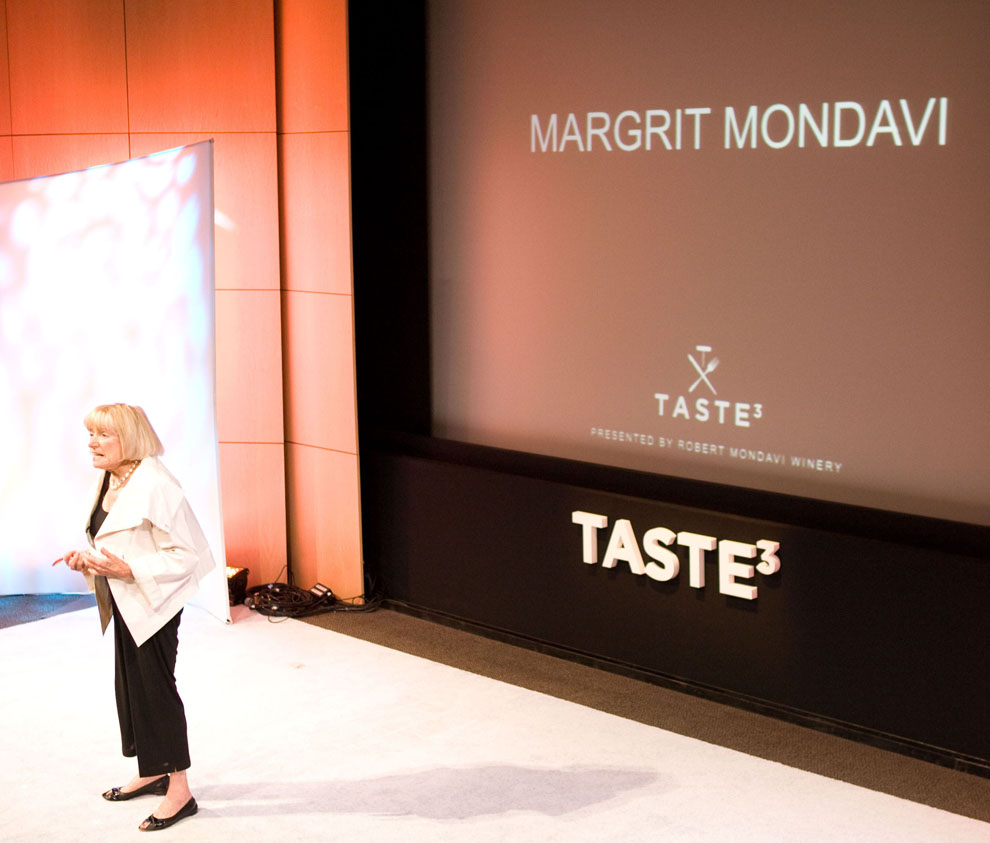Robert Mondavi constantly reminded the world that wine was part of a “civilized life.” For him, the apex of human experience, the trifecta, was wine, food and art. Mondavi began the physical realization of this idea with the advent of Copia, an 80,000 square foot center for the arts, food and wine, sitting on 12 acres in downtown Napa, which opened in 2001. The second concrete iteration of Mondavi's philosophy came in the form of a yearly conference called Taste3. Inspired by the 40th anniversary of the Robert Mondavi Winery, which helped to forever change the way American’s viewed wine, the Taste3 conference, has grown to become, in a few short years, a forum for fresh ideas, new thought patterns and unique perspectives on wine, food, art and how we as human beings fit into the scheme of things.
With its third presentation now over, the preparations have already begun for the next Taste3. I was fortunate to be invited and to experience firsthand the intensive few days of a whirlwind schedule of speakers, dinners, interaction with fellow attendees, sponsors and of course, wine. Thursday evening is the opening reception, a chance to gather and meet several hundred of your soon to be closest friends, punctuated by Mondavi wines. Then Friday the conference starts with a bang. 
To that end, the line up of speakers were as diverse as the subject matter: The Center for Agroecology and Sustainable Food Systems from UC Santa Cruz, a professor of chemical engineering at UC Davis, master baker Peter Reinhart, writers, social activists, entrepreneurs, artists, and the research leader of the USDA Processed Foods Research Unit. Some speakers had much in common, others were diametrically opposite. But all shared the stage to enlighten, inform and expand on their areas of expertise, be that vending machines, food, consumption, the future of wineries in a changing climate, musicians, filmmakers or even the honeybee expert. In between sessions and during lunch breaks there was time for conversation. To assume that each break provided opportunity for consistent idea swapping would be over stating the reality. However, I did find myself engaged in compelling conversations, albeit brief and challenging. After all, the reason for being at Taste3 is to enlarge your mind as to what might be possible, even if in the confines of a small sphere of influence.
Interspersed with this were luxurious winery dinners. Thirty or forty people attend one of eight different offerings. Some of Napa’s finest wineries, like Rubicon Estate, Quintessa and Hall, graciously opened their doors to taste3 attendees. I had the distinct pleasure of being at the Hess Collection, where not only a well executed meal was presented, but paired with some of Hess’s finest wines, including their 2002 Lion, all overlooking the Mayacamas mountains. I was seated next to a sommelier one on side, and Serge Hochar, a Lebanese winemaker whose Chateau Musar wines have been produced since the 1930s, on the other. What followed during the three course meal were like minded people who have different opinions, shared within the context of respectful conversation.
That Taste3 aims to tweak, inspire, or flat out recharge people’s conventional thinking is part of the plan. But certainly one cannot help but be more open to the idea of wine, food, art when one is removed from the daily stresses. To be in Napa, to sample wines (I visited other wineries in my spare time like Andretti, and Folie au Deux, and sought out dinners replete with fresh ingredients) is to re-connect with the idea of wine, not as a commodity, which it certainly is, but to allow yourself to simply be in the iconic valley tasting wine, made by passionate people who put forth their best each year. Not every wine appeals to a mass audience.
But the joy of driving Highway 29, and stopping randomly at a winery I’ve not visited before, seeing the beauty of the geographic area and to meet people at the tasting bar and be, briefly involved in their lives (whether to swap stories about wineries, restaurants or points outside of Napa), is to honor the idea that Robert Mondavi had in his head all along. Wine is a living, breathing entity which is constantly evolving in the bottle. So too are ideas; the ability to change our minds, to rejuvenate, evolve and grow, to believe in a cause and to act upon that belief makes us better human beings. We may not agree with all we hear or experience at Taste3, just like I may not find every single winery I visit compelling, but it is the act of opening our minds, the willingness to try something new that makes us and therefore our world a better place. The next Taste3 conference will soon be here. Perhaps it’s worth considering attending, worth the expansion of our consciousness and a better understanding of food, wine, art and ourselves.






